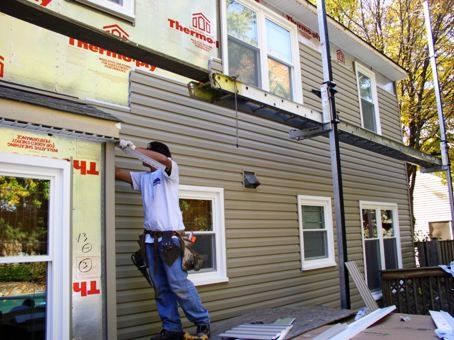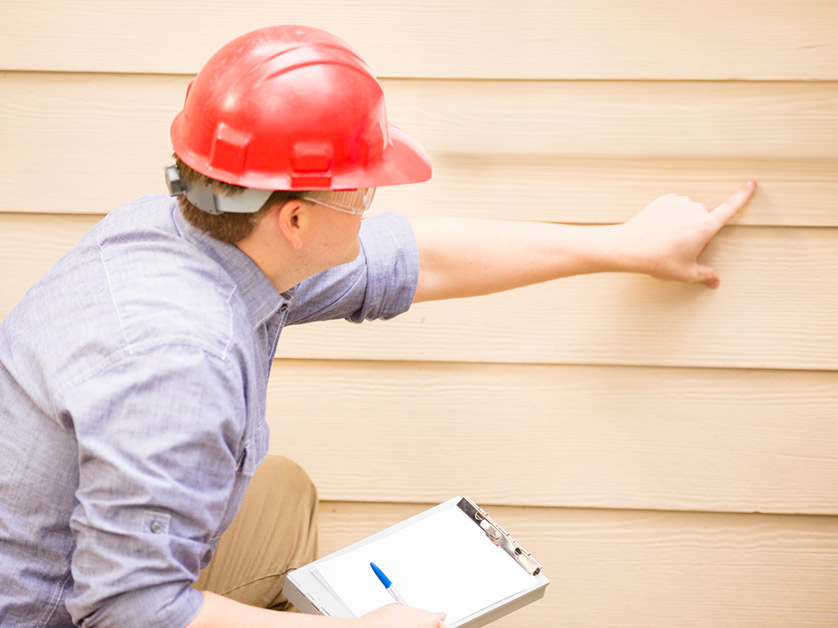Your Go-To Morris Siding Contractor for All Residential Siding Needs
Your Go-To Morris Siding Contractor for All Residential Siding Needs
Blog Article
The Necessary Guide to the Various Kinds Of Siding and Their One-of-a-kind Benefits
In the world of home improvement, selecting the right home siding is an important choice that impacts both aesthetic allure and practical efficiency. The variety of materials readily available, such as wood, vinyl, fiber metal, concrete, and block, each offer special advantages that satisfy different requirements and choices. Understanding these distinctions can dramatically boost the longevity and value of a residential or commercial property - morris siding contractor. Nonetheless, with a lot of options to think about, which home siding material absolutely stands out for your particular job? Checking out these options can bring about informed choices that straighten with both design and usefulness.
Timber House Siding
Timber exterior siding, a popular option for property exteriors, provides a timeless visual that integrates natural appeal with structural integrity. This house siding product is offered in various designs, consisting of clapboard, roof shingles, and board-and-batten, allowing homeowners to tailor their appearance to match their design preferences. Timber home siding is usually crafted from durable varieties such as cedar, redwood, or yearn, which are known for their resilience and capacity to endure environmental stress factors.
One of the key benefits of wood house siding is its outstanding insulation homes, which can add to power efficiency and reduced heating prices. Furthermore, timber exterior siding is eco-friendly, making it an ecologically friendly choice when sourced sustainably. Normal maintenance, consisting of paint or staining, can extend its life expectancy and boost its appearance, permitting homeowners to protect the natural charm of the timber.
However, prospective downsides include susceptibility to parasites, rot, and weather damages, demanding adequate treatment and upkeep - morris siding contractor. Regardless of these concerns, when correctly looked after, timber exterior siding can supply a beautiful and durable solution that improves the character of a home while using a cozy, welcoming environment

Plastic Exterior Siding
Vinyl exterior siding has actually become a leading choice for house owners seeking a low-maintenance outside alternative that incorporates sturdiness and affordability. This functional material is crafted from polyvinyl chloride (PVC), making it immune to various climate condition, consisting of moisture and UV rays. As an outcome, plastic home siding does not warp, rot, or discolor, guaranteeing durable aesthetic allure.
One of the main advantages of vinyl house siding is its comprehensive variety of shades and styles, allowing house owners to attain the wanted search for their property without the requirement for regular repainting. Additionally, plastic siding is very easy to set up, which can dramatically decrease labor expenses throughout construction or remodelling tasks.
Plastic exterior siding additionally adds to energy effectiveness. Several alternatives feature insulation support, which boosts thermal efficiency, aiding to maintain comfortable indoor temperatures and potentially reducing power costs. Furthermore, its smooth surface helps with simple cleaning, requiring only regular washing with a garden hose pipe to eliminate dirt and debris.
Fiber Cement Siding
Fiber concrete house siding has actually gained grip amongst homeowners and home builders alike as a result of its exceptional combination of toughness and aesthetic flexibility. Composed of a mixture of cellulose, concrete, and sand fibers, this siding alternative is crafted to endure extreme weather, including high winds, hefty rainfall, and temperature variations, making it a durable option for domestic outsides.

One of the key benefits of fiber concrete siding is its resistance to bugs, such as termites, and its non-combustible nature, offering enhanced fire safety and security. morris siding contractor. Furthermore, it is readily available in a vast variety of designs, textures, and colors, enabling homeowners to accomplish their wanted visual without sacrificing efficiency
An additional advantage is its low upkeep needs; fiber cement exterior siding typically needs paint or discoloration every 5-10 years, which is less frequent than other materials. Moreover, its long life adds to a lower total price of ownership, as it decreases the requirement for frequent repair work or replacements.
Ultimately, fiber cement exterior siding represents an exceptional financial investment for those looking for a resistant, eye-catching, and functional outside alternative, incorporating both type and feature to improve the Visit Your URL home's visual charm.
Metal Home Siding
The allure of metal exterior siding depends on its robust sturdiness and modern-day visual charm, making it a preferred selection for modern style. Offered in materials such as aluminum and steel, metal siding uses a variety of finishes and colors, enabling property owners to accomplish a personalized appearance that matches their style vision.

Energy efficiency is one more considerable advantage, as lots of steel home siding products are created with insulation options that aid control indoor temperature levels. This can result in reduced energy prices over time. In addition, steel home siding is often recyclable, making it an environmentally friendly selection for sustainability-minded homeowners.
The installation process for steel house siding can be relatively simple, leading to a quicker turnaround time for building tasks. Overall, steel home siding combines performance and design, making it a sensible option for those seeking a visually appealing and long-lasting exterior coating.
Block and Stone Exterior Siding
Brick and rock siding stands apart as an ageless option that boosts the visual appeal of any home. Understood for their durability and low maintenance, these products offer an exceptional return on financial investment while raising the building's visual charm. Readily available in numerous colors, textures, and patterns, brick and stone can be tailored to suit varied building styles, from conventional to modern-day.
One of the main advantages of brick and stone home siding is their power performance. Both materials possess all-natural shielding residential or commercial properties that help control indoor temperatures, potentially minimizing heating and air conditioning costs. In addition, they supply exceptional fire resistance compared to various other siding choices, adding to boosted safety and security.
Another benefit is their longevity. Block and stone can last for years, commonly requiring very little upkeep beyond periodic cleaning. Unlike wood exterior siding, they are resistant to pests and rot, guaranteeing a durable outside that holds up against the aspects.
Conclusion
In summary, the choice of exterior siding considerably influences a home's visual appeal, energy efficiency, and maintenance requirements. Each type of house siding-- whether timber, plastic, fiber steel, cement, or block and rock-- supplies distinct benefits tailored to different homeowner preferences and ecological problems.
One of the key advantages of timber home siding is its superb insulation residential properties, which can add to power effectiveness and reduced heating prices. Additionally, wood exterior siding is eco-friendly, making it an eco pleasant alternative when sourced sustainably.One of the main benefits of metal siding is its resistance to numerous environmental aspects.Energy effectiveness is another significant benefit, as many steel home siding products are created with insulation options that assist control interior temperature useful source levels. Each kind of house siding-- whether timber, plastic, fiber metal, concrete, or brick and stone-- offers special advantages customized to various house owner Recommended Site choices and ecological problems.
Report this page